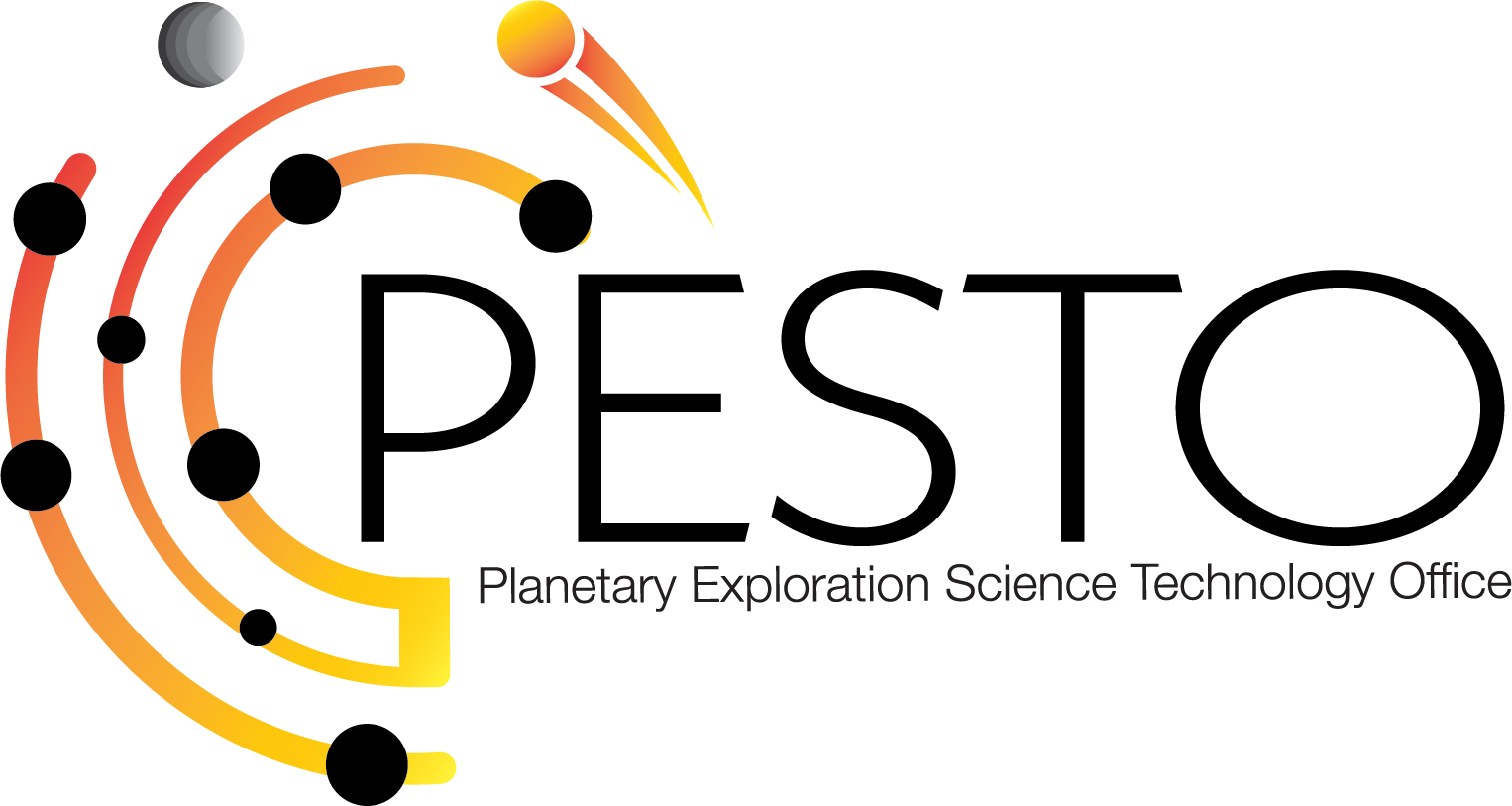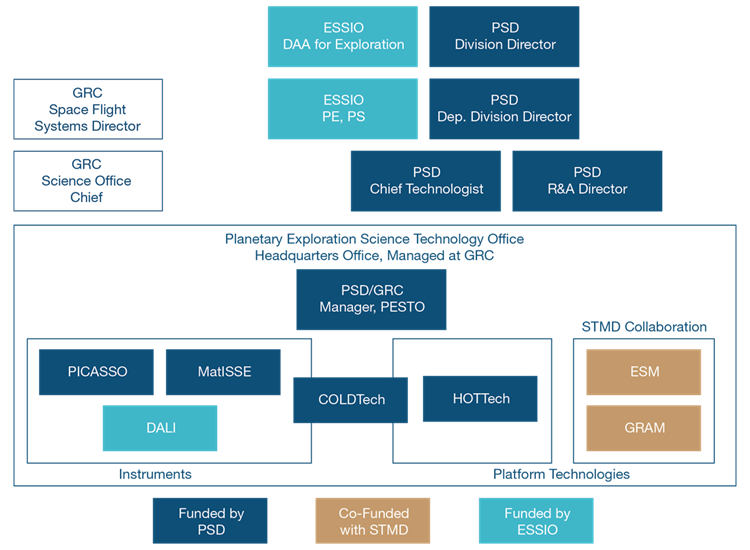About
The Planetary Exploration Science Technology Office (PESTO) is managed at Glenn Research Center (GRC) as part of the Planetary Science Division (PSD).
PESTO manages technology development (for TRL<6) through programs such as PICASSO, MatISSE, DALI; makes recommendations for technology strategies for instruments, spacecraft, and mission support; coordinates planetary science technologies within NASA’s Science, Space Technology, Exploration Systems Development Mission Directorates, Earth Exploration Science Strategy Integration Office, PSD, and community requirements; and promotes technology infusion into missions.
PESTO Charter and Purpose
NASA Headquarters office managed at GRC to:
Recommend technology investment strategy for future planetary science missions
- Instruments
- Spacecraft Technology
- Mission Support Technology
Manage Planetary Science technology development (non-mission specific, competitively funded, <TRL6)
- Write solicitations (PICASSO, DALI, MatISSE, etc…)
- Conduct review panels
Coordinate planetary science-relevant technologies
- Within PSD, ESSIO & SMD and with STMD & ESDMD
- Outreach and partner with the science and technology community
- Well rounded portfolio with Planetary Science specific needs, technology opportunities, novel / high impact
Promote technology infusion and technology pipeline
- Infusion starts before solicitations are written, ends with mission adoption
- Study infusion successes and obstacles; recommend changes
PESTO Team
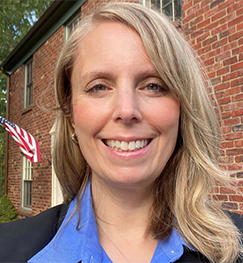
|
Erica Montbach Manager PESTO, Program Officer COLDTech, Technical Interface to SBAG PESTO’s Manager, Dr. Montbach, crafts the technology investment strategy for future planetary science missions, manages all pre-mission planetary science technology development, coordinates with other technology development programs, and infuses technology into planetary science. She holds a Ph.D. in Chemical Physics from the Liquid Crystal Institute at Kent State University. Her experience has focused on research and development, entrepreneurship, small business innovation, industry trend analysis, public private partnerships, patent portfolio maturation, and grants management. She has leveraged her unique roles as a manager and industrial scientist in government and in advanced manufacturing corporations to foster public-private collaborations with academic colleagues, business executives, student interns, teachers and community leaders to drive the dissemination of knowledge gained from research and expand opportunities for traditionally underserved individuals, particularly women and minorities, in basic and applied science and technology. |

|
Michael Lienhard Program Officer, MatISSE, HOTTech, Technical Interface to VEXAG Michael Lienhard has been a Project Officer (PO) in the Planetary Exploration Science Technology Office (PESTO) since 2021. His current responsibilities include the HOTTech, MatISSE, and PICASSO (joint responsibility) programs. He has an interest in utilizing communities of practice and promoting open science and IDEA to increase project success. He is serving as the acting lead of the Discovery Program.Previously, Michael served as a research engineer in the Smart Sensing and Electronics System Branch at the NASA Glenn Research Center, focusing on harsh environment nanotechnology.Michael earned his bachelor’s degree in chemistry at the State University of New York at Binghamton and his doctorate at the Rensselaer Polytechnic Institute. |
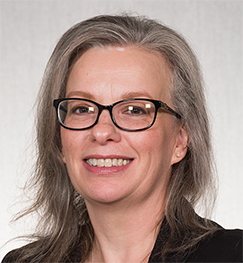
|
Anna Maria Pal Program Officer, DALI, Technical Interface to LEAG, MExAG Anna Maria Pal is the Program Officer for PESTO’s Development and Advancement of Lunar Instrumentation (DALI) program. She joined PESTO in 2023 after over 20 years with the Photovoltaics and Electrochemistry Branch at Glenn Research Center (GRC) as an aerospace technologist working in direct energy conversion. She developed new photovoltaic cell designs and array technology utilizing two laboratories with organo- metallic vapor phase epitaxy (OMVPE) systems. During this time, she helped to further the use of solar arrays in extreme environments with her work on the Extreme Environments Solar Power (EESP) project and the Vertical Solar Array Technology (VSAT) for the Lunar Surface project both funded through the Space Technology Mission Directorate’s (STMD) Game Changing Development (GCD) program. She also served as a Contracting Officer’s Representative and Technical Monitor for projects to develop flight hardware and payloads, such as the solar cell concentrator demonstration unit on the Double Asteroid Redirect (DART) Mission. She has a B.S. in Physics and Mathematics from Cleveland State University and has completed coursework towards a M.S. in Materials Science and Engineering from Case Western Reserve University. |

|
Leonard Dudzinski PSD Chief Technologist Content to follow... |

|
Shahid Aslam Program Officer, PICASSO Shahid Aslam is serving as a Program Officer for the PICASSO Program in the PESTO Office. Dr. Aslam has several years of space instrument hardware development and remote sensing experience with direct contributions to the following NASA flight programs: Pressure Modulated Infra-Red Radiometer (PMIRR) on Mars Observer; Composite Infra-Red Spectrometer (CIRS) on Cassini; Gas and Aerosol Monitoring Sensor-craft (GAMS); Stratospheric Aerosol and Gas Experiment III (SAGE III) and James Web Space Telescope (JWST). Currently is the principal engineering lead for the Compact Ultraviolet to Visible Spectrometer (CUVIS) on the DAVINCI Mission to Venus, to be launched in 2029. |
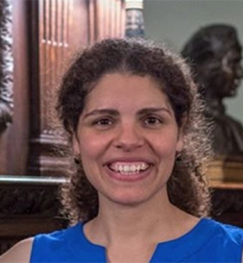
|
Dr. Majd Mayyasi Participating Scientist, Technical Interface to ExMag, MAPSIT Dr. Majd Mayyasi is a part-time IPA with the Science Mission Directorate and a member of the NASA Planetary Exploration Science Technology Office (PESTO). Her background is in data analysis, instrument development and calibration, and numerical simulations. Majd spent time in industry as a computer engineer where she worked with big data and big queries before she transitioned into academia and is currently a senior research scientist at the Center for Space Physics at Boston University. Her research focus is on terrestrial observations of the lunar exosphere, atmospheric escape and energy balance at Mars, building and calibrating UV spectrographs, and studying interplanetary/interstellar interactions. She is a member of the NASA MAVEN and MSL science teams. Majd assists with the PICASSO program among others in R&A, she is a liaison to the MAPSIT assessment group, and will contribute to developing recommendations for equitable access to science through DAPR, IDEA, and the nascent Planetary Fellowship programs. She also mentors and organizes education and public outreach initiatives with a focus on underserved K-12 communities. |

|
Jeffrey Hall Associate Directorate Technologist at JPL, Technical Interface to OPAG Dr.Hall is the PESTO liaison to the Jet Propulsion Laboratory (JPL). At JPL he serves the dual role of deputy manager of the technology program office and associate directorate technologist, both for the Planetary Science Mission Directorate at the lab. Over the course of his career he has worked on and led many technology projects in such disparate areas as cryogenic engineering, planetary balloons, aerocapture, and robotics for extreme environments. He has served as a line and program manager, and also worked on many proposals and studies for future missions across the solar system. A key role he plays in supporting PESTO is to originate and guide technology assessment studies for future solar system exploration. |
PESTO Office
Science Mission Directorate Office of the Associate Administrator Org Chart
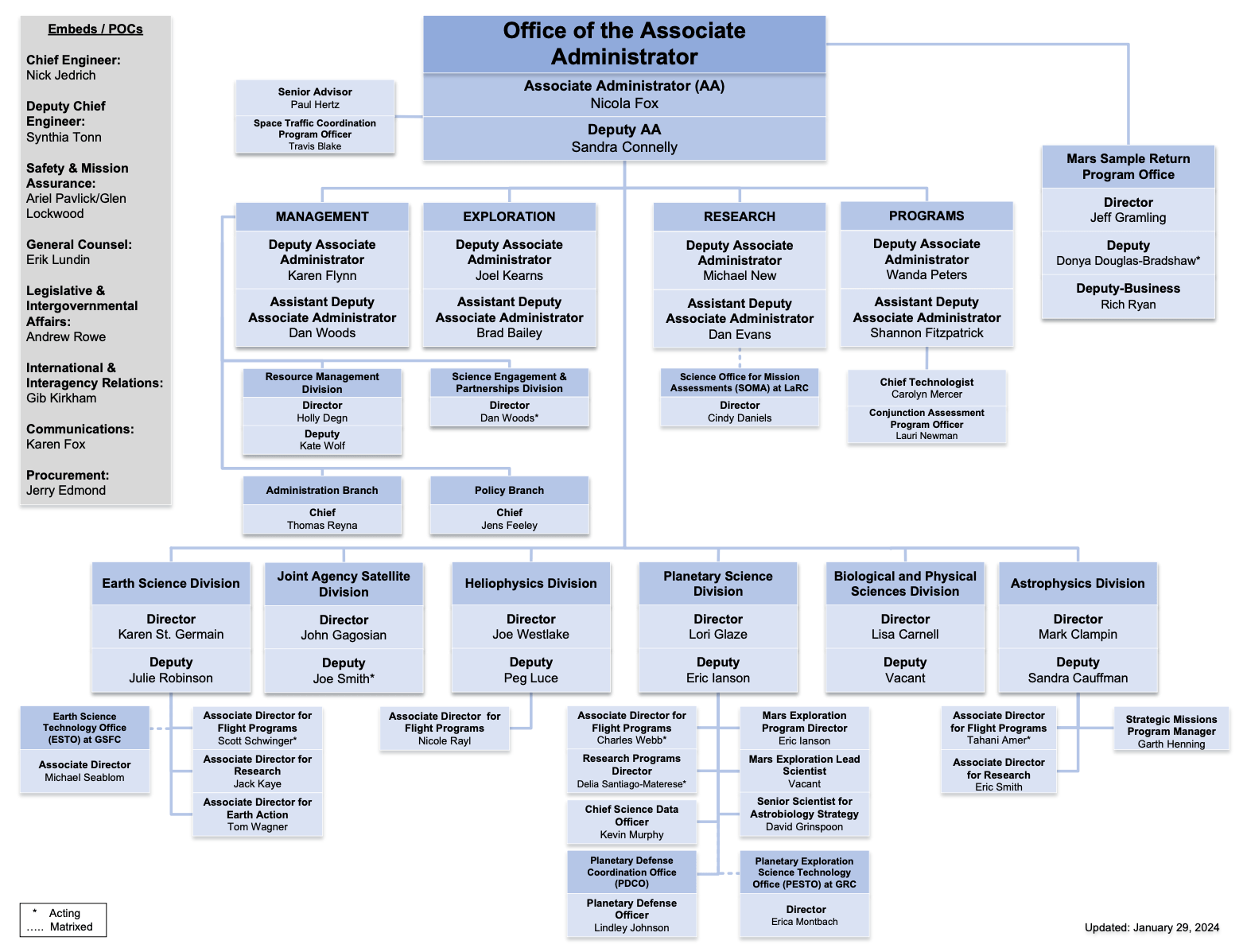
FAQ
- Research Opportunities in Space and Earth Science (ROSES) solicitations are posted annually on the NSPIRES website.
- You can also subscribe to the NSPIRES mailing list by logging in and checking the appropriate box.
- TRL or Technology Readiness Levels are a type of measurement system used to assess the maturity level of a particular technology.
- More information on Technology Readiness Levels
- PESTO programs are funded through the omnibus solicitation called Research Opportunities in Space and Earth Science (ROSES) ROSES-23
- Check out information for Researchers
- Check out the ROSES FAQ
- No Due Date (NoDD) proposals may be submitted at any time during the open period of the ROSES solicitation.
- Research Programs with No (Fixed) Due Date (NoDD) or Rolling Submissions
- Planetary Science Division No Due Date (NoDD) FAQ

